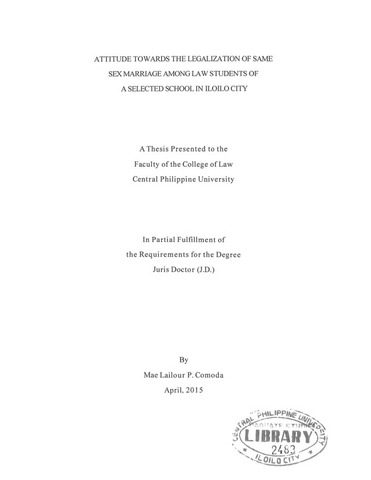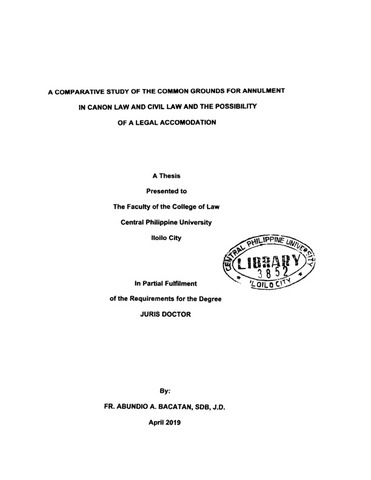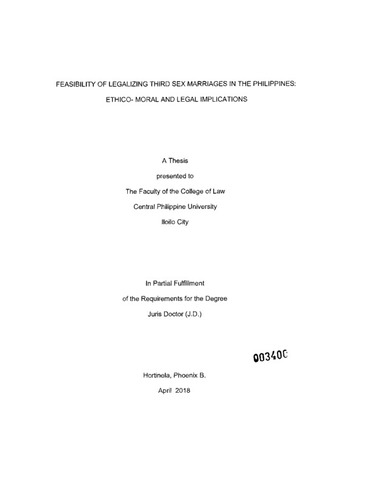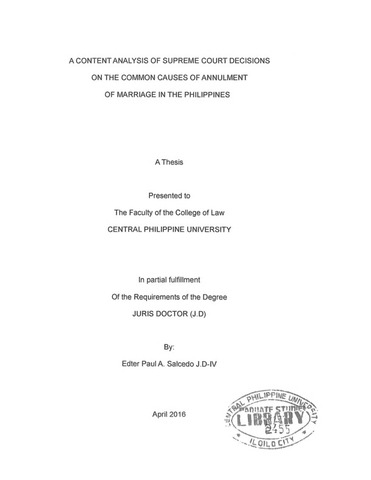Attitude towards the legalization of same sex marriage among law students of a selected school in Iloilo City
Abstract
This study was conducted to determine the attitude towards the legalization of same sex marriage among law students of a selected school in Iloilo City. The study specifically aims to find out the percentage of CPU law students who agreed or disagreed for the legalization of same sex marriage, the top reasons why said law students agreed or disagreed for the legalization of same sex marriage, the percentage of law students who thinks that the legalization of same sex marriage violates the guarantee of equal protection clause of the 1987 Philippine Constitution, and the top reasons why said students think that the legalization of same sex marriage violates the guarantee of equal protection clause of the 1987 Philippine Constitution.
After the survey has been conducted, the solicited answers proved that majority or 70 % of the respondents have negative attitude towards the legalization of same sex marriage in the Philippines. The respondents provided the following reasons to justify xi their opposition. They believe that same sex marriage is (1) against Christian values; (2) it is immoral and lastly; (3) it is against the purpose of marriage itself which is procreation since couples of the same sex could impossibly bear a child.
On the other hand, majority of the respondents or 85% of the respondents believes that prohibition on same sex marriage on gays, lesbians and transsexuals does not violate their rights on equal protection of the laws. Such belief is grounded on the following reasons: (1) it is provided by the law; (2) there is no substantial distinction between gays, lesbians and transsexuals, and males and females hence the latter be governed by the civil law in the constitution of the family; (3) it defeats the purpose of marriage which is procreation and lastly; (4) marriage is not a right but a privilege.
All in all, majority of the respondents has a negative attitude towards the legalization of same sex marriage despite the current trend wherein members of the third sex was given place and acceptance in the society may it be internationally or merely here in the Philippines. As earlier discussed, the top reason for this negative attitude is that same sex marriage is against the Christian values likewise that the same is considered immoral. This only proves that even with the advent of technology and western influence of liberality, law students of today is still guided by the Christian values and morality.
The attitude of the respondents towards same sex marriage as well as the reasons thereof only show the applications of the Natural theory. The Natural Law Theory states that what is consistent with the natural law is right and what is not in keeping with the natural law is wrong. In this view humans have reasoning and the laws of nature are discernible by human reason. Thus, humans are morally obliged to use their reasoning to discern what the laws are and then to act in conformity with them. Humans have a natural drive to eat, drink, sleep and procreate. These actions are in accord with a natural law for species to survive and procreate. Thus activities in conformity with such a law are morally good. Activities that work against that law are morally wrong. As an example consider that to eat too much or too little and place life in jeopardy is morally wrong.
Description
Abstract only
Suggested Citation
Comoda, M. L. P. (2015). Attitude towards the legalization of same sex marriage among law students of a selected school in Iloilo
City (Unpublished postgraduate thesis). Central Philippine University, Jaro Iloilo City.
Type
ThesisSubject(s)
Keywords
Department
College of LawDegree
Juris DoctorShelf Location
GSL Theses 340.72 C737
Physical Description
ii, 65 leaves
Collections
- Juris Doctor [144]
Related items
Showing items related by title, author, creator and subject.
-
A comparative study of the common grounds for annulment in canon law and civil law and the possibility of a legal accommodation
Bacatan, Abundio A. (2019)This study conducted a point-by-point comparison of law of the Roman Catholic Church and the law of the Republic of the Philippines with regard to the grounds for annulment and the process that is involved in their respective ... -
Feasibility of legalizing third sex marriages in the Philippines: Ethico-moral and legal implications
Hortinela, Phoenix B. (2018)This descriptive-correlational study, conducted in February 2017, aimed at ascertaining the feasibility of legalizing third sex marriages in the Philippines, as well as its ethical, moral and legal implications. It likewise ... -
A content analysis of Supreme Court decisions on the common causes of annulment of marriage in the Philippines
Salcedo, Edter Paul A. (2016)This study was conducted to find out the different common causes of annulment in the Philippines. It aims to find out the reasons why nullification of marriages are on rise as marriage is highly regarded in the Philippines ...





